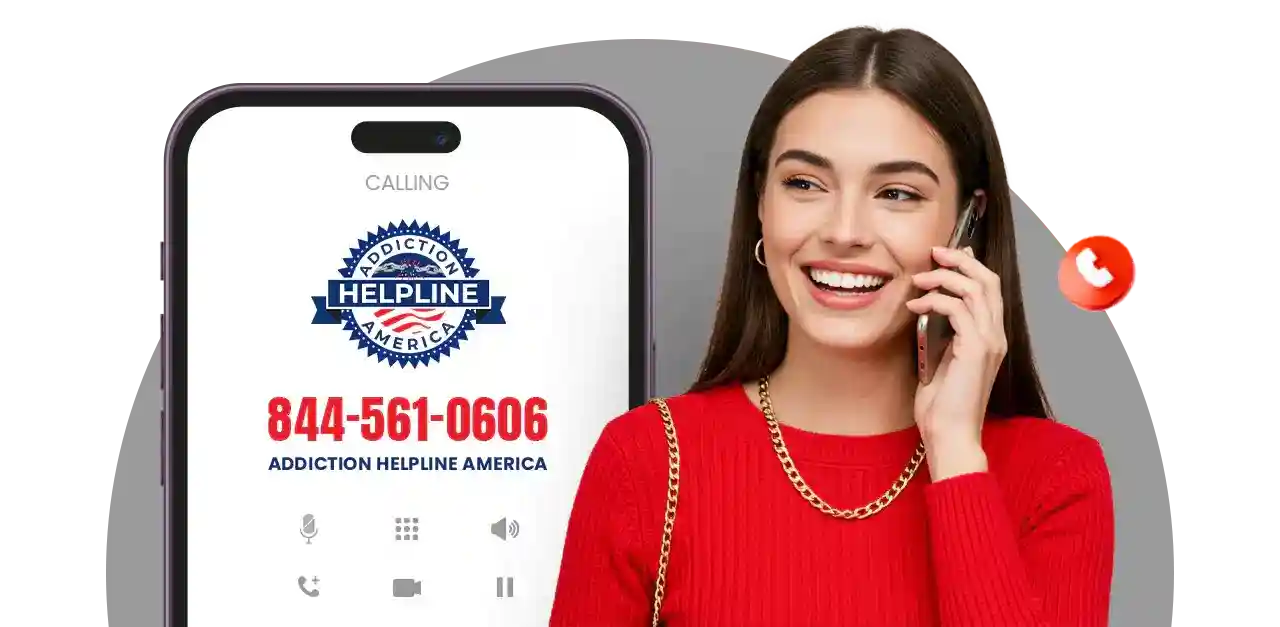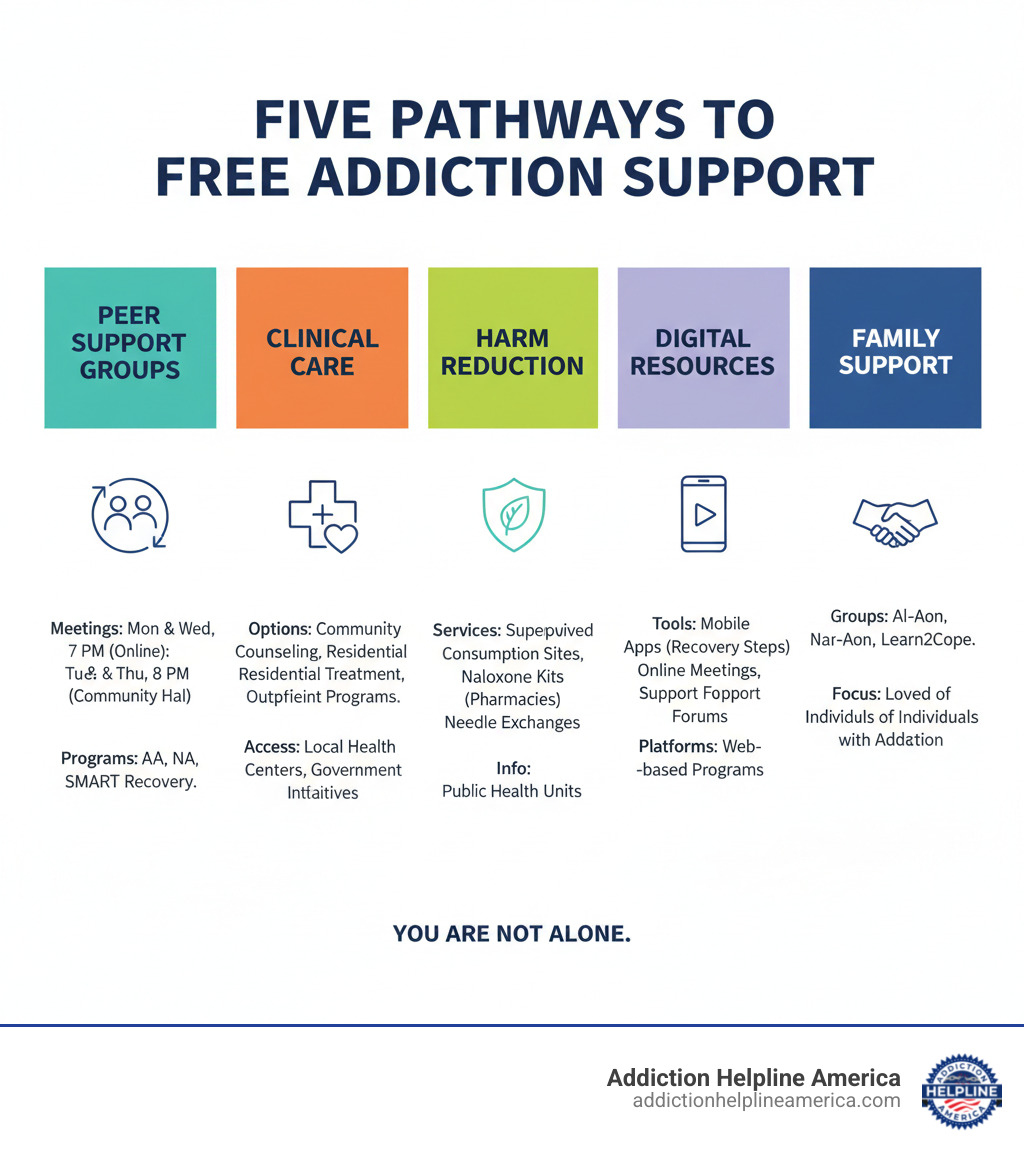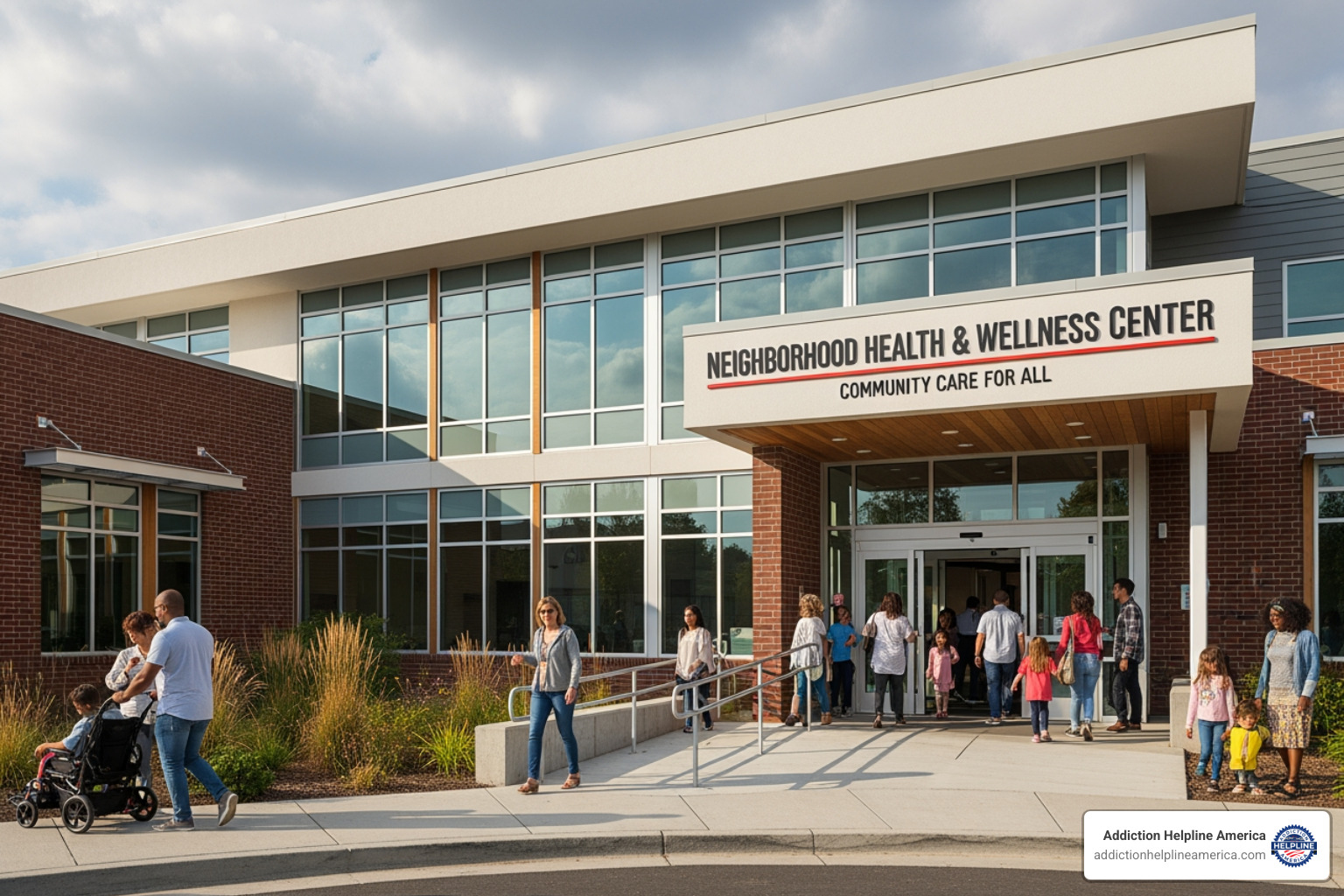
Why Free Addiction Support Matters More Than Ever
Free addiction support is available now through helplines, peer support groups, government programs, and online resources—no insurance or payment required. Whether you’re struggling or worried about a loved one, you can access confidential 24/7 guidance, join recovery meetings, or connect with local treatment services at no cost.
Quick Access to Free Support:
- 24/7 Helplines: Get immediate, confidential guidance.
- Peer Support Groups: Join free meetings like Alcoholics Anonymous, Narcotics Anonymous, or SMART Recovery.
- Government Services: Access publicly funded treatment and counseling.
- Online Resources: Use mobile apps and virtual meetings from anywhere.
- Family Support: Find free groups for loved ones of people with addiction.
More than a third of North Americans will experience a mental health or addiction problem. You are not alone. Many don’t know where to turn or believe they can’t afford help. The truth is, a vast network of free addiction support exists across the United States and Canada.
“Addiction thrives in isolation, while connection nurtures recovery,” as research consistently shows. The good news? Connection and support are available right now, at no cost.
At Addiction Helpline America, we connect individuals and families with vital free addiction support resources. We provide 24/7 confidential guidance to help you steer treatment options and begin your recovery journey. This guide will show you where to find that help.
Free addiction support basics:
Step 1: Know Your Options: From Peer Groups to Clinical Care
Recovery looks different for everyone. You might be aiming for abstinence, harm reduction, or simply using less. The good news is that free addiction support comes in many forms, and you can choose what feels right.
Addiction treatment is a spectrum, from informal peer support to intensive residential care. It often co-exists with depression, anxiety, or trauma, so effective treatment addresses the whole picture—not just substance use. Mental health and addiction are deeply connected by biology, life experiences, and coping mechanisms.
For a complete overview, check out our Free Addiction Recovery Programs Guide and explore our Mental Health Toolkit.
Understanding Different Treatment Models
Let’s walk through your options. The key is finding what resonates with you.
Peer support groups are a free backbone of recovery. In 12-step programs like Alcoholics Anonymous (AA) or Narcotics Anonymous (NA), people meet regularly to share stories and work toward abstinence, finding power in a community that understands.
SMART Recovery is a science-based alternative focused on self-empowerment. Meetings teach practical skills from cognitive behavioral therapy to manage urges, build motivation, and create a balanced life. It works for any addictive behavior.
Community treatment programs offer professional support in your neighborhood, including assessment, counseling, and skill-building. Some counselors can meet you at home or work to make help accessible.
Group therapy, led by trained facilitators, provides a safe space to develop coping strategies and realize you’re not alone.
Residential or inpatient treatment provides 24-hour care in a structured environment. While some programs charge fees, many government-funded and non-profit options offer free addiction support or sliding-scale payments.
Day treatment offers intensive programming while you live at home, ideal for those with family or work commitments.
Medication-assisted treatment (MAT) uses medications like methadone or naltrexone to manage withdrawal and cravings. These are medical tools prescribed by professionals, and many public programs cover the cost.
Residential withdrawal management (detox) provides medical supervision as substances leave your body, creating a safe foundation for ongoing treatment.
Harm reduction services meet you where you are without judgment. They focus on reducing negative consequences through services like naloxone distribution (to reverse opioid overdoses) and access to sterile supplies, often provided free by public health agencies.
The Connection Between Mental Health and Addiction
Addiction is often a way of coping with deeper issues like trauma, anxiety, or depression. When someone has both a mental health condition and a substance use disorder, it’s called a dual diagnosis or co-occurring disorders. The two feed off each other.
This is why integrated care is crucial. Treating addiction without addressing the underlying mental health condition is like bailing out a boat without plugging the leak. The most effective treatment tackles both simultaneously.
Mental illnesses and addictions share common roots, including biology and life experiences. People with mental health conditions are more vulnerable to substance use, and chronic substance use can worsen mental health symptoms. If you’re dealing with both, you’re not broken; you’re human. Many resources in this guide address co-occurring disorders.
The pandemic highlighted this connection, as isolation and stress drove substance use rates higher. You can read more about the scientific research on the implications of pandemics on substance use disorder to understand this pattern. Seeking mental health support is a sign you’re ready to feel better—and that’s where recovery begins.
Step 2: Explore Self-Empowerment with Evidence-Informed Recovery Programs
Recovery doesn’t have to mean giving up control. Some of the most effective free addiction support programs put you in the driver’s seat, teaching you practical skills to manage your life and create lasting change on your own terms. These programs offer a stigma-free approach, focusing on behavior and empowering you to change it.
What Are Evidence-Informed Recovery Programs and How Do They Work?
Evidence-informed recovery programs are built on science and proven therapeutic techniques. They draw from research in psychology and behavioral science to provide strategies that work.
SMART Recovery is a well-known example. The name stands for Self-Management And Recovery Training, and it’s rooted in therapeutic approaches like cognitive behavioral therapy (CBT). It helps people change unhelpful thinking patterns and behaviors.
The program centers on a 4-Point Program®:
- Building and Maintaining Motivation: Find your “why” for change and keep it alive.
- Coping with Urges: Learn practical techniques to manage cravings and triggers.
- Managing Thoughts, Feelings, and Behaviors: Identify and change unhelpful patterns.
- Living a Balanced Life: Create a lifestyle that supports long-term well-being.
SMART Recovery meetings are skill-focused and welcome anyone struggling with problematic behaviors, from substances to gambling or eating disorders.
Here’s how evidence-informed programs compare to traditional 12-step approaches:
| Feature | 12-Step Programs (e.g., AA, NA) | SMART Recovery |
|---|---|---|
| Philosophy | Spiritual, surrender to a higher power, peer sponsorship | Self-empowerment, rational thinking, self-management, science-based |
| Approach | Step-by-step process, confession, moral inventory | Tools and techniques from CBT/REBT, skill-building, self-directed |
| Focus | Abstinence, spiritual growth, admitting powerlessness | Managing urges, motivation, emotions, balanced living, personal growth |
| Leadership | Peer-led, often by individuals with long-term sobriety | Trained volunteer facilitators |
| Addictions Addressed | Primarily substance use (alcohol, specific drugs) | Any problematic or addictive behavior (substances, gambling, eating, etc.) |
| Cost | Free (voluntary donations accepted) | Free |
| Religious Affiliation | Spiritual, but not religious (though some interpret it as such) | Secular, no religious affiliation |
| Key Difference | Focus on powerlessness and spiritual awakening | Focus on personal power and rational decision-making |
Both approaches have helped countless people. The key is finding what resonates with you. Many people even participate in both.
For more information, explore our Free Addiction Recovery Programs Guide and our Mental Health Toolkit.
How to Access Free Recovery Resources
Accessing free addiction support programs like SMART Recovery is simple. You can find local in-person meetings or join online meetings from anywhere with an internet connection. Online meetings are accessible on any device and allow you to participate via audio, video, or text chat.
There are no costs to attend SMART Recovery meetings. The organization offers optional handbooks and a mobile app with additional tools, but the core support and skills are available to everyone at no charge. Ready to take a step? Find a Free Support Meeting through our directory.
Step 3: Tap Into Nationwide and Regional Free Addiction Support
When you’re looking for free addiction support, knowing where to start can be the hardest part. A comprehensive network of helplines and resources is ready to help 24/7 across the United States and Canada. These services exist to guide you through your options and connect you with immediate support.
Addiction Support Services Across North America
Helplines offer a first conversation with someone who understands—no judgment, just guidance.
Addiction Helpline America is here to connect you with addiction and mental health treatment centers nationwide. We provide free, confidential, personalized guidance 24/7. The moment you’re ready for help matters, and we’re here for it. You can Get help with substance use right now.
The Substance Abuse and Mental Health Services Administration (SAMHSA) operates a National Helpline at 1-800-662-4357. It offers referrals to treatment, support groups, and information on substance use disorders in English and Spanish.
If you’re in crisis or having thoughts of suicide, the National Suicide Prevention Lifeline is available by calling or texting 988. This service provides immediate support for intersecting mental health and addiction crises.
For fellowship-based recovery, Narcotics Anonymous (NA) can be reached at 818-773-9999 x 771 for help finding a support group. The Crisis Text Line is another option—text NAMI to 741741 for immediate assistance.
During traumatic events, which can trigger substance use, the Disaster Distress Hotline at 1-800-985-5990 offers specialized support. The StrongHearts Native Helpline at 1-844-762-8483 provides culturally-appropriate support for Native Americans. New parents can find help through Postpartum Support International at 1-800-944-4773.
Finding Free Addiction Support in Your Area
Sometimes you need resources closer to home. Every state in America offers publicly funded addiction services, though they operate under different names.
For example, Colorado’s Behavioral Health Administration helps with overlapping mental health and substance use concerns, while New York’s Office of Addiction Services and Supports (OASAS) oversees a comprehensive service network. From Alabama’s Division of Mental Health Substance Abuse Services to Wisconsin’s state programs, help is available.
State systems can be complex. That’s why Addiction Helpline America exists—to help you cut through the confusion and Find local support services that match your specific situation. We know which programs have availability and might be the best fit for you.
If you’re in Oklahoma, we have specific information on Free Inpatient Drug Rehab Centers in Tulsa Oklahoma. For alcohol-specific treatment, our Free Alcohol Rehab Guide provides detailed information. You don’t have to figure out the system alone; reach out to us, and we’ll help you find immediate free addiction support in your area.
Step 4: Find Local Government-Funded Programs and Services
In your community, a network of government-funded programs provides free addiction support. These resources aren’t always advertised, but they are funded by tax dollars to ensure that lack of money doesn’t prevent anyone from getting help. The challenge isn’t whether they exist, but knowing how to access them.
Navigating Local Free Support Systems
Your local health department is a great starting point. Most counties fund community-based treatment centers offering free counseling, group therapy, and outpatient services. They provide assessments, ongoing support, and skill-building workshops.
Local crisis lines and helplines, connected to state and national networks, are staffed by people who can direct you to help in your area. Some communities also offer specialized programs, such as structured psychotherapy for co-occurring disorders or community hubs where multiple services are available under one roof.
Harm reduction services are increasingly available. Many local health departments provide free naloxone kits and training to reverse opioid overdoses. Where legal, supervised consumption sites offer safe environments and connect people to care. These services are about keeping people alive and building trust.
Our Access Addiction Helpline America’s service directory was built to bridge this gap, connecting you directly to resources in your community. We’ve done the searching so you can get help now.
Specialized Support for Indigenous Peoples
Indigenous communities face unique challenges rooted in historical trauma and systemic barriers. Generic treatment programs often fall short, which is why specialized, culturally sensitive free addiction support is so important.
Culturally-sensitive care incorporates traditional healing practices, ceremonies, and cultural teachings into recovery. It involves elders and community leaders who understand the broader context of addiction in Indigenous communities.
The StrongHearts Native Helpline is a starting point for Native Americans seeking support. Staff understand that substance use often intertwines with other issues and can connect you to culturally appropriate resources.
We believe effective treatment respects your heritage. That’s why we prioritize helping you Find Indigenous treatment centres that honor cultural traditions while providing evidence-based care. Recovery means reclaiming your identity, not leaving it behind.
Step 5: Use Digital Resources and Support for Loved Ones
Help can now arrive through a screen. The digital age has transformed access to free addiction support, making it more immediate and private. These tools are not just for the person struggling with addiction; they are also for the family and friends walking this path alongside them.
Digital Tools for Your Recovery Journey
Your smartphone can be a powerful ally in recovery, offering convenience and support whenever you need it.
Online recovery platforms host virtual meetings you can join from anywhere. SMART Recovery, for example, offers online meetings with audio, video, and text chat options. These platforms also have community forums for asking questions and sharing experiences.
Overdose prevention apps are a key harm reduction innovation. These tools can guide you through responding to an overdose, including instructions for administering naloxone and connecting to emergency services.
General wellness apps for mindfulness, meditation, and stress reduction can help build the emotional resilience needed for long-term recovery. Managing your mental health is a vital part of the process.
We’ve gathered resources to help you explore these digital pathways. You can Download recommended wellness apps to support your journey. For information on local treatment, we have details like these on More info on rehab centers in Tulsa.
Support for Families and Friends
Addiction is a family disease. If you love someone with a substance use disorder, you are affected too. You might feel scared, angry, or helpless. You are not alone, and you deserve support.
Al-Anon and Nar-Anon are long-standing 12-step peer support groups for families affected by alcohol and drug use, respectively. They offer a safe space to share experiences and learn from others who understand.
Parents of Addicted Loved Ones (PAL) groups offer free, confidential support for parents, providing education and coping strategies in a community of people who get it.
SMART Recovery for Family & Friends applies the same evidence-based tools to help you cope, set healthy boundaries, and encourage your loved one’s recovery without losing yourself.
Online forums and communities, like those offered by Partnership to End Addiction, have become lifelines for families. These digital spaces blend peer support with educational resources, allowing you to connect when you need it most.
Recovery happens in community. Whether you are the person struggling or the one supporting them, you need your own support system. We’re here to help you Find a Family Support Group that provides the understanding and compassion you need.
Conclusion: Your Path to Recovery Starts with a Single Step
You’ve made it through this guide, which shows you’re ready to take action. Whether for yourself or a loved one, researching options is a powerful first step.
We’ve walked through five practical steps: understanding your treatment options, exploring self-empowerment programs, tapping into national helplines, finding local services, and using digital and family support. You’ve seen the wide range of free addiction support available.
Here’s what matters most: free addiction support is abundant. You don’t need insurance or money. You just need to reach out.
At Addiction Helpline America, we understand that first step can feel overwhelming. We’re here to provide free, confidential, personalized guidance to connect you to the right recovery program. We’ve helped thousands find their way, and we’re ready to help you too.
Recovery isn’t a straight line, but with the right support, lasting change is absolutely possible. The life you’re hoping for—where addiction no longer calls the shots—is within reach.
Your path to recovery starts with a single step. Make that step today.
Our helpline is 100%
free & confidential
If you or someone you care about is struggling with drug or alcohol addiction, we can help you explore your recovery options. Don’t face this challenge alone—seek support from us.
Programs
Resources
Will my insurance
cover addiction
treatment?
We're ready to help
Find the best
drug or alcohol treatment
center
Are you or a loved one struggling with addiction? Call today to speak to a treatment expert.
















